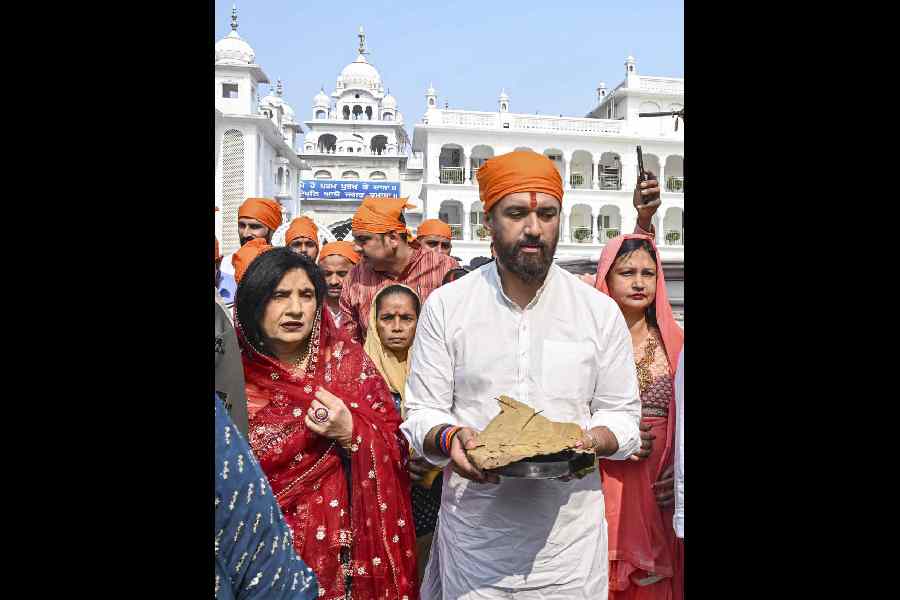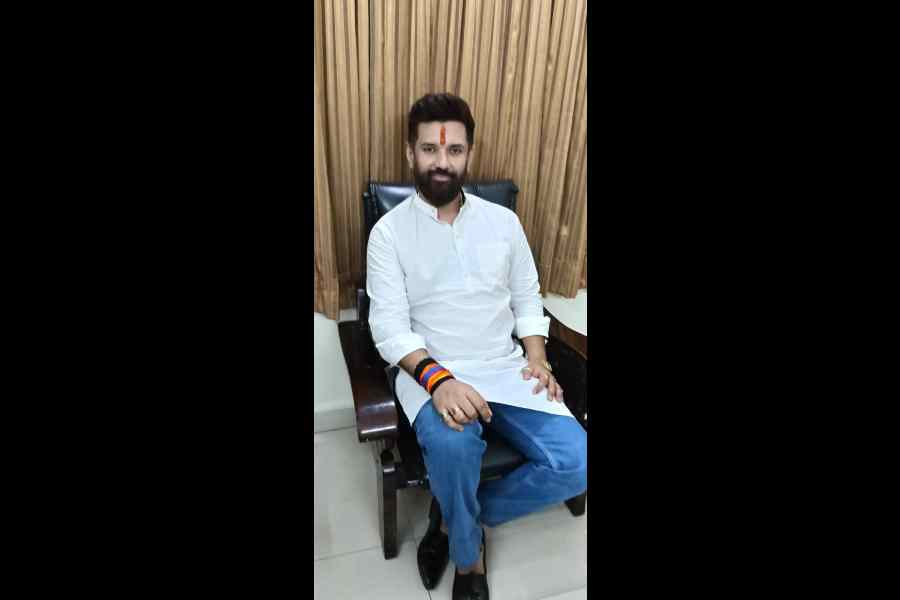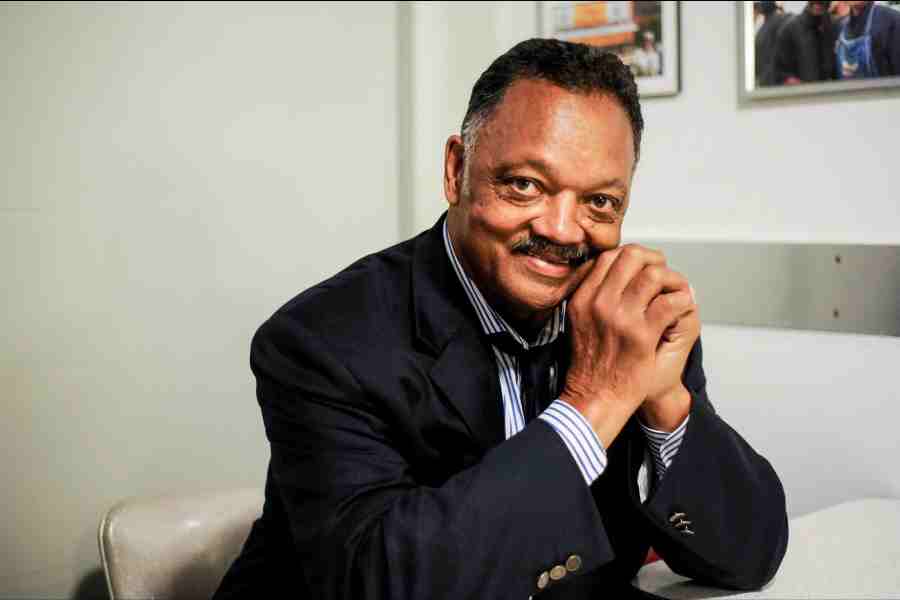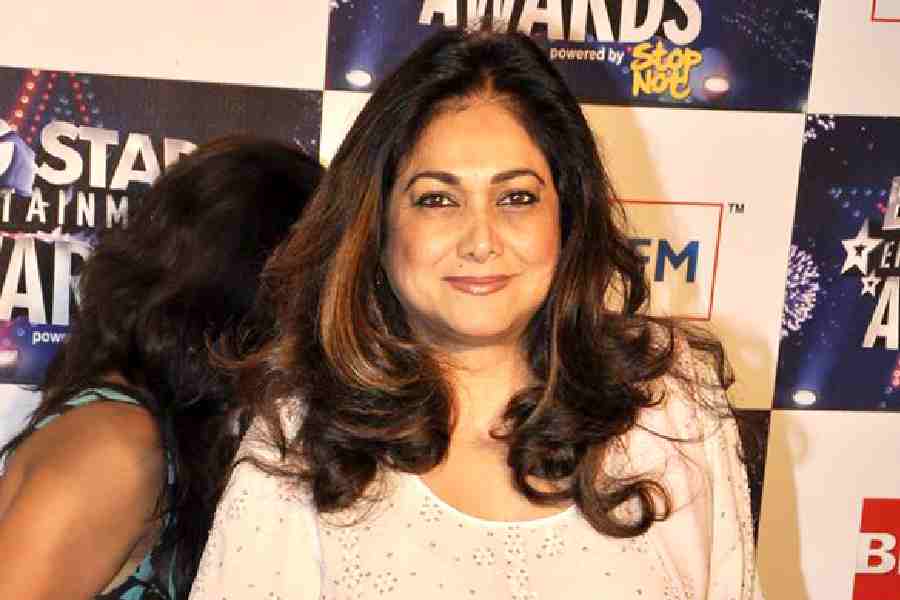With his Lok Janshakti Party (Ram Vilas) winning 19 seats in Bihar, Chirag Paswan, 43, is being touted as a leading contender for the chief minister’s post once Nitish Kumar leaves the scene.
The Union food processing minister told The Telegraph at his Patna home that he would focus on his responsibilities at the Centre for the “next two-three years”, after which “I will shift my full attention to the state and prepare for the next (2030) election”.
Q. What message do you think this stunning mandate sends out?
A. The message is clear — Bihar has voted for development. For years, we kept hearing that Bihar votes only on caste lines. That thinking held back our state. But this election shows a big shift. People rose above caste boundaries and supported development-oriented politics. I have data that proves this change.
A major reason for this shift is the way the Prime Minister focused on Bihar for the past year. It’s not a small thing for a PM to visit one state 12-13 times in a year. It showed the voters that Bihar truly matters to him.
At the same time, our chief minister, Nitish Kumarji, brings decades of experience. His leadership, combined with the PM’s commitment, built great confidence among the people.
My campaign of “Bihar First, Bihari First” also connected strongly. The last time I wasn’t part of the NDA, but this time my presence strengthened the alliance.
Q. Two possible ‘son-rises’ — Tejashwi Yadav’s and Chirag Paswan’s — were keenly watched this election. How do you see this?
A. I have always focused on the welfare of all the 14 crore people of Bihar. I don’t divide Biharis into agda (upper castes), pichda (backward castes), Dalits or Muslims. If we want Bihar to become the No. 1 state in India, we must go beyond caste divisions.
But Tejashwi continued the same politics that we saw in the 1990s. His strategy still revolves around the old “MY” — Muslim and Yadav — formula. That divides the state on communal and caste lines.
I also talk about “MY,” but in my case it stands for Mahila and Yuva — women and youth. Even the Prime Minister mentioned this after the results. And that is exactly what Bihar needs today.
People rejected the politics of fear and Jungle Raj long ago. They threw it out in 2005, repeated that decision in 2010, and would have done the same in 2015 if Nitishji had not joined hands with the RJD. Even in 2020, my decision to contest alone helped the RJD win more seats; otherwise, the mandate would have been very different.

Union Minister Chirag Paswan with his mother Reena Paswan during a visit to the Takhat Sri Harimandir Ji Patna Sahib, in Patna PTI
Q. What role do you expect to play in this new government?
A. I see myself playing an important and active role, especially in implementing my vision of “Bihar First, Bihari First”. That is my priority.
The number of ministerial berths or my specific role — these discussions will happen within the alliance, so I don’t want to comment publicly yet. In a day or two, everything will be clearer.
But what I can say with certainty is that now the real responsibility begins. The people of Bihar have placed huge trust in us, and it is time to pay them back. Earlier, I was supporting from the outside. Now, as part of the system, I share full responsibility — for the good and the bad.
My focus will be on delivery and performance.
Q. Before the polls you had said you wanted to return to Bihar and contest. Why did you step back?
A. It happened because of time constraints. The seat shares were finalised very late. By the time everything was settled, we had only one day left to file nominations. There was no time to discuss my own candidature.
But I have always been clear that I want to return to Bihar. Unlike my father (the late socialist veteran Ram Vilas Paswan), who preferred working from Delhi, I feel strongly that to serve my state properly, I must be in Bihar. I am fully prepared to shift and work from the state.
So, yes, in 2030, I will definitely contest the state elections and play a more direct role.
Q. But why wait till 2030? You could join this government.
A. Not immediately. I also have a major responsibility at the Centre. I was a single MP, yet the Prime Minister trusted me with five Lok Sabha seats to contest. That was a huge responsibility, and I want to continue fulfilling my central role for now.
In Bihar, my MLAs will have a strong role to play in the government. And I will support them fully.
Q. Still, if you want to work for Bihar, shouldn’t you be part of the state government?
A. I believe I already play an important role in the “double engine” system. Many crucial decisions at the Centre need coordination with the state, and I can ensure that it happens smoothly.
For the next two-three years, I want to focus on my responsibilities at the Centre. After that, I will shift my full attention to the state and prepare for the next elections.
Q. If offered the deputy chief minister’s post, will you take it?
A. No. That’s not for me right now. If such a post is created for my party, a party worker can take it. Whether that happens or not is yet to be decided.
Q. Is your party demanding the deputy CM’s post?
A. These things remain behind the curtain for now. Once the negotiations end, everything will be transparent.
What I can say is that I will remain closely involved with Bihar. Whatever time I get besides my central responsibilities, I will spend in the state. Over the past three years, I have regularly travelled across Bihar, and the support I get from people keeps me motivated.
Surveys wrote me off, and rumours were spread about tensions between my party and the JDU. But the peopleof Bihar proved those narratives wrong.
Q. Looking back, what went wrong in 2020 that made you contest alone?
A. In hindsight, I was a bit inexperienced. I demanded more space within the alliance than was possible. And then I lost my father in the middle of the election — that changed everything.
The BJP wasn’t ready to give me the number of seats I wanted. I felt cornered, and eventually I decided to test my strength by contesting alone. I didn’t win many seats, but I proved my vote base.
That performance later gave the BJP the confidence that Chirag was not as weak as they had believed in 2020. And in 2025, we created a strong, successful alliance.
Q. You were the one who convinced your father to join Modi’s NDA before 2014. How do you see that decision today?
A. I’m very happy that we made that choice. The Opposition has only weakened since then. Many leaders seem driven by personal ambition rather than national interest. Joining the NDA was theright decision.
It wasn’t easy, though. My father initially reacted strongly and said, “Mai jehar kha loonga lekin Bhajpa ke saath nahi jaunga (I’d rather drink poison than join the BJP).” For two months, I didn’t bring itup again.
But the Congress leadership wasn’t taking us seriously. Sonia Gandhiji asked us to meet Rahulji, but for three months he didn’t give us time. That hurt my father.
In January 2014, he finally agreed — and the decision changed our political future for the better.
Q. Given your success, any advice for Rahul Gandhi or Tejashwi Yadav?
A. I don’t know if they want advice from me. But regarding Tejashwi — he is like a younger brother. I know what family issues feel like; I’ve gone through similar pain myself. I hope things get resolved for him.
Politically, he must realise that he’s losing ground election after election. He thinks everything revolves around him, but voters don’t see it that way. He needs to let go of arrogance and understand the changing mood in Bihar.
Q. You are often seen as a future Bihar CM. Would that require merging your party with the BJP?
A. Never. I shall never merge my party with any other. Whatever I achieve will be through the party my father founded. That legacy is non-negotiable for me.










